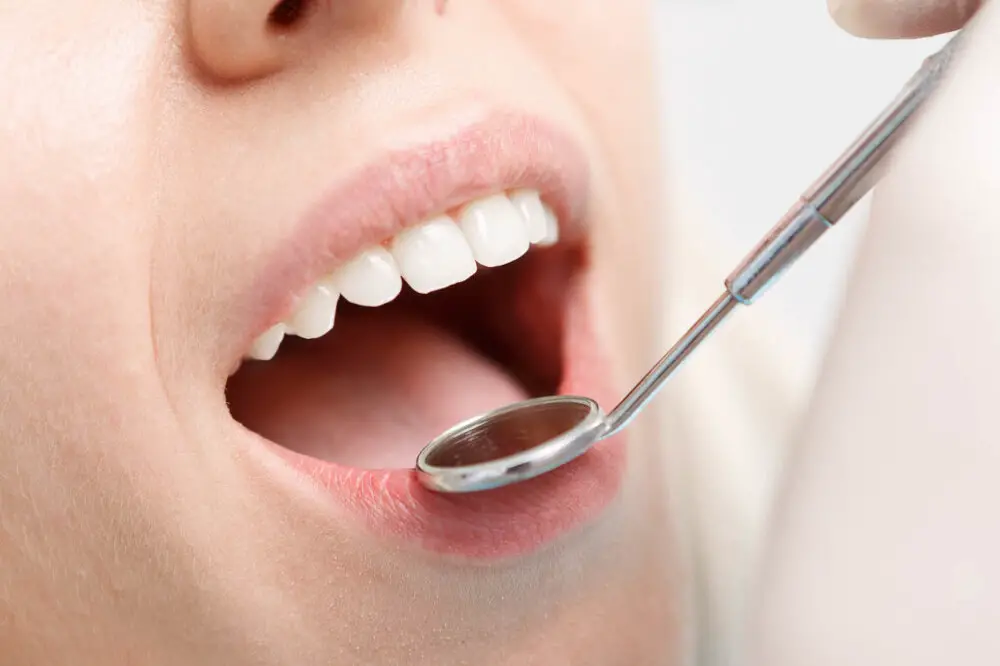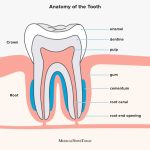Why Does Eating Sweets Cause Tooth Pain: Understanding Tooth Sensitivity

Tooth pain is one of the most uncomfortable experiences that we can encounter. From a sharp, throbbing sensation to a dull ache, it can affect our daily routine and our mood. One of the most common causes of tooth pain is tooth sensitivity, which is often triggered by eating sweets. Understanding why this happens is essential to avoid discomfort and take care of our oral health. In this article, we will explore the causes of tooth sensitivity, the impact of sugar on our teeth, and how to prevent tooth pain. Tooth sensitivity occurs when the enamel, the protective layer of our teeth, wears down, exposing the dentin, which contains microscopic tubules that connect to the nerves in the pulp of our teeth. When we eat or drink something hot, cold, sweet, or acidic, the stimuli can reach the nerves through the tubules, causing pain or discomfort. The factors that can contribute to tooth sensitivity include brushing too hard, using a hard-bristled toothbrush, gum recession, grinding our teeth, gum disease, and teeth whitening products. By understanding what causes tooth sensitivity, we can take steps to prevent it and protect our oral health.
Tooth sensitivity is a common dental problem that causes discomfort or pain in the teeth while eating or drinking hot, cold, sweet, or sour foods and drinks. The sensitivity occurs when the protective layer of the tooth, called enamel, wears away, exposing the underlying layer, called dentin, which contains microscopic tubules that lead to the nerve of the tooth. The tubules allow the stimuli to reach the nerve, causing the sensation of pain or discomfort. Tooth sensitivity can be caused by a variety of factors, including tooth decay, gum recession, tooth grinding, acid erosion from acidic foods or drinks, aggressive brushing, and certain dental procedures. It is important to identify the underlying cause of tooth sensitivity and seek dental treatment to prevent further damage and alleviate the discomfort.
Tooth sensitivity is a common dental problem that can cause sharp pain and discomfort when eating or drinking hot, cold, sweet, or acidic foods and beverages. Understanding tooth sensitivity is important because it can be a symptom of underlying dental issues, such as tooth decay, gum disease, or enamel erosion. Ignoring tooth sensitivity can lead to more serious dental problems and even tooth loss. Additionally, tooth sensitivity can have a significant impact on a person’s quality of life, causing them to avoid certain foods and drinks or experience discomfort during everyday activities like brushing and flossing. By understanding tooth sensitivity, individuals can take steps to prevent and treat dental problems, improve their oral health, and enjoy a pain-free smile.
How Teeth Work

Teeth are an essential part of the human body that helps to break down food into smaller pieces for easy digestion. They are made up of different layers, including enamel, dentin, and pulp. The enamel is the outer layer of the tooth, which is the hardest and most mineralized part of the body. It protects the tooth from damage caused by chewing, biting, and grinding. The dentin is the layer beneath the enamel, which is softer and contains tiny tubes that lead to the pulp. The pulp is the innermost layer of the tooth, which contains nerves and blood vessels that supply the tooth with nutrients. Teeth work by grinding and breaking down food into smaller pieces, which are then mixed with saliva to form a bolus that can be easily swallowed. The process of chewing also stimulates the production of saliva, which helps to neutralize the acid produced by bacteria in the mouth. The acid can erode the enamel, exposing the dentin and causing tooth sensitivity. Poor oral hygiene, consuming sugary foods, and acidic drinks can also lead to tooth decay and sensitivity. It is important to maintain good oral hygiene, including brushing twice a day, flossing, and regular dental checkups to keep your teeth healthy and prevent tooth sensitivity.
The tooth is a complex structure that consists of several different layers and tissues, each of which performs a specific function. The outermost layer of the tooth is the enamel, which is the hardest substance in the human body and protects the underlying dentin and pulp. The dentin contains tiny tubules that transmit sensations, and the pulp contains nerves and blood vessels that nourish the tooth. The root of the tooth is anchored in the jawbone by the periodontal ligament, which provides stability and support. When we eat, our teeth play a crucial role in breaking down food and preparing it for digestion. However, consuming sugary or acidic foods and drinks can erode the enamel, expose the dentin, and cause tooth sensitivity and pain.
Enamel, dentin, and pulp are the three main components of a tooth. Enamel is the hard, outermost layer that protects the tooth from external factors. It is composed of minerals such as calcium, and is the hardest substance in the human body. Dentin is the layer underneath the enamel, and it is responsible for supporting the enamel and providing structure to the tooth. It is also made up of minerals, but it is less dense than enamel. The pulp is the innermost layer of the tooth, and it contains nerves and blood vessels that keep the tooth alive. When sugar and acid from sweets come into contact with the enamel, it can cause erosion and lead to tooth sensitivity.
What Causes Tooth Sensitivity

Tooth sensitivity is a common dental problem that affects millions of people worldwide. It is characterized by a sharp, shooting pain in the teeth when exposed to certain stimuli, such as hot or cold temperatures, sweet or acidic foods, and even cold air. The pain usually occurs in the root surface of the tooth, which is the part that is exposed when the gum recedes or wears away. The main cause of tooth sensitivity is the exposure of the dentin, a porous layer of tissue that lies beneath the hard enamel of the tooth. When the dentin is exposed, it allows the stimuli to reach the nerve endings inside the tooth, triggering the pain response. There are several factors that can lead to the exposure of the dentin and the development of tooth sensitivity. One of the most common causes is tooth decay or cavities, which can erode the enamel and expose the dentin. Gum recession due to periodontal disease or aggressive brushing can also lead to dentin exposure. Other factors that can contribute to tooth sensitivity include cracked or chipped teeth, teeth grinding, and dental procedures such as teeth whitening or fillings. Additionally, certain lifestyle habits like smoking and excessive consumption of acidic or sugary foods and drinks can also exacerbate tooth sensitivity. Understanding the underlying causes of tooth sensitivity is crucial to preventing and managing this dental problem.
Tooth sensitivity can be caused by various factors, including enamel erosion, gum recession, and tooth decay. Enamel erosion occurs when the protective outer layer of the tooth is worn away, exposing the sensitive dentin underneath. This can be caused by acidic foods and drinks, brushing too hard, or grinding the teeth. Gum recession, which is often a result of poor oral hygiene, exposes the roots of the teeth and causes sensitivity. Tooth decay can also lead to sensitivity, as it results in the erosion of the tooth’s protective layers. These common causes of tooth sensitivity can be prevented by maintaining good oral hygiene, avoiding acidic foods and drinks, and seeking treatment for dental issues as soon as they arise.
Eating sweets can lead to nerve exposure and tooth pain due to several factors. One of the main factors is the erosion of tooth enamel caused by the acidic content in sweets. When enamel wears away, it exposes the underlying dentin layer, which contains microscopic tubules that lead to the tooth’s nerve endings. As a result, the nerve endings become more vulnerable to external stimuli such as hot, cold, and sweet foods, leading to pain and sensitivity. Furthermore, poor oral hygiene and gum recession can also contribute to nerve exposure and sensitivity. Therefore, it is essential to maintain good oral hygiene and limit the intake of acidic and sugary foods to prevent tooth pain and sensitivity.
Why Eating Sweets Causes Tooth Pain

Tooth pain after consuming sweets is a common dental problem that many people experience. The main reason for this discomfort is due to tooth sensitivity. The outer layer of our teeth, known as enamel, protects the inner layers of the teeth, including the dentin and nerves. However, when the enamel is damaged or eroded, the dentin and nerves become exposed, leading to tooth sensitivity. Consuming sweets and sugary foods can weaken the enamel, allowing bacteria to thrive and create cavities. The sugar in sweets reacts with the bacteria in the mouth to form an acid that can erode the enamel and cause tooth sensitivity. Another reason why eating sweets causes tooth pain is due to the temperature sensitivity of the teeth. Cold or hot sweets can trigger pain in the teeth, making it difficult to eat or drink. When the enamel is weakened, the nerves and dentin become more sensitive to temperature changes. The sudden temperature change from consuming sweets can cause a sharp pain sensation in the teeth, making it uncomfortable to eat or drink. Additionally, consuming sugary foods frequently can cause tooth decay and gum disease, leading to more severe dental problems. Therefore, it is essential to maintain good oral hygiene by brushing twice a day, flossing regularly, and visiting the dentist every six months to prevent tooth sensitivity and other dental issues.
When sugar interacts with bacteria in the mouth, it initiates a process that leads to the production of acid. These bacteria are present in plaque, a sticky film that forms on the teeth. When sugar is consumed, the bacteria in plaque feed on it and produce acid as a byproduct. This acid then attacks the enamel of the teeth, which is the hard outer layer that protects the tooth. Over time, this process can lead to tooth decay and sensitivity. Additionally, the acid produced by the bacteria in the mouth can also irritate the nerves in the teeth, causing pain and discomfort. Therefore, it is important to limit the consumption of sugary foods and maintain good oral hygiene to prevent the buildup of plaque and protect the teeth from acid erosion.
Acidic foods and drinks can erode the enamel, which is the hard, protective layer on the outside of your teeth. When the enamel is worn away, the underlying layer of dentin may become exposed. Dentin contains tiny tubules that lead to the nerve center of your tooth, which can cause pain and sensitivity. Once the enamel is gone, it cannot be replaced, and the damage to your teeth can become permanent. Eating sugary foods and drinks can increase the amount of acid in your mouth, which can speed up the erosion of your enamel. It is important to maintain good oral hygiene practices and limit your intake of acidic and sugary foods and drinks to protect your teeth from erosion and nerve exposure.
When we consume sugary foods, the bacteria in our mouth feed on the sugar, producing acid that can wear away the protective layer of enamel on our teeth. Over time, this can lead to tooth sensitivity, as the underlying dentin is exposed. The frequency of sugar intake also plays a role in tooth sensitivity, as frequent exposure to sugar and acid can lead to more rapid erosion of enamel. Additionally, brushing too hard or using a hard-bristled toothbrush can also contribute to tooth sensitivity by wearing away enamel. To prevent tooth sensitivity, it’s important to limit sugar intake and brush gently with a soft-bristled toothbrush.
Managing Tooth Sensitivity

Tooth sensitivity can be a nuisance, especially when it comes to consuming sweets. However, there are ways to manage tooth sensitivity and enjoy your favorite treats without the pain. One way to manage sensitivity is by using toothpaste specifically designed for sensitivity. These toothpaste contain potassium nitrate or strontium chloride which can help reduce sensitivity over time. It is important to use the toothpaste consistently for at least two weeks to see results. In addition to using sensitive toothpaste, it is important to avoid brushing too hard as this can cause further damage to already sensitive teeth. Using a soft-bristled toothbrush and gentle brushing techniques can help reduce further damage. Another way to manage tooth sensitivity is by avoiding acidic and sugary foods. These types of foods can cause further damage to sensitive teeth and increase sensitivity. Instead, opt for foods that are high in calcium such as dairy products or leafy greens. Calcium can help strengthen teeth and reduce sensitivity. It is also important to maintain good oral hygiene by brushing twice a day and flossing regularly. This can help prevent further damage to teeth and reduce sensitivity over time. By following these simple steps, you can manage tooth sensitivity and enjoy your favorite sweets without the pain.
Tooth sensitivity can be a painful and uncomfortable experience, but there are several strategies for managing this condition. One of the most effective ways to combat tooth sensitivity is through the use of desensitizing toothpaste, which contains ingredients like potassium nitrate that help to block nerve signals in the teeth. Additionally, fluoride treatments can help to strengthen tooth enamel and reduce sensitivity over time. Lifestyle changes, such as avoiding acidic or sugary foods and drinks, can also help to alleviate tooth sensitivity by reducing the risk of enamel erosion and tooth decay. By incorporating these strategies into your dental care routine, you can enjoy a more comfortable and pain-free smile.
Seeking professional dental care for tooth sensitivity is crucial for maintaining optimal oral health. Tooth sensitivity can be a sign of underlying dental problems such as cavities, gum disease, or worn enamel. Ignoring tooth sensitivity can lead to more significant dental issues, including tooth decay or even tooth loss. A dental professional can diagnose the underlying cause of tooth sensitivity and provide appropriate treatment, such as dental fillings or root canal therapy. Additionally, professional dental cleaning and regular check-ups can help prevent tooth sensitivity from occurring in the first place. Therefore, seeking professional dental care is essential for not only relieving pain but also ensuring long-term oral health.
Tooth sensitivity is a common problem that affects many people, and it can be caused by various factors such as tooth decay and gum disease. One of the most common causes of tooth sensitivity is eating sweets, which can cause temporary pain and discomfort in the teeth. This is because sugar reacts with the bacteria in our mouth to produce acid, which can erode the protective enamel layer of the teeth. When this happens, the underlying dentin layer of the teeth is exposed, which contains tiny nerve endings that can be easily stimulated by hot, cold, or sweet foods. To prevent tooth sensitivity, it is important to maintain good oral hygiene and avoid consuming too many sugary foods and drinks.
Tooth sensitivity is a common dental problem that affects people of all ages. It is characterized by a sharp pain or discomfort in the teeth when exposed to certain stimuli such as hot or cold drinks, sweet foods, or acidic substances. Understanding the causes of tooth sensitivity is essential to prevent it from occurring or worsening. Some of the most common causes of tooth sensitivity include gum recession, enamel erosion, tooth decay, and teeth grinding. By addressing these underlying causes, individuals can take steps to reduce tooth sensitivity and improve their overall oral health. Regular dental check-ups, proper oral hygiene, and a balanced diet can also help prevent tooth sensitivity and related dental issues.
If you’re experiencing tooth pain after indulging in sweets, it’s important to take action to protect your dental health. Seeking professional dental care is key to identifying the underlying cause of your tooth sensitivity and developing a treatment plan that works for you. In addition, taking steps to protect your teeth on a daily basis, such as brushing and flossing regularly and avoiding excessive sugary foods, can help prevent future tooth pain and sensitivity. By prioritizing your dental health, you can enjoy your favorite treats without worrying about the consequences.
Conclusion

In conclusion, tooth sensitivity is a common dental issue that affects many people, and eating sweets is one of the main culprits behind it. When we consume sugary foods and drinks, the bacteria in our mouth produce acids that erode the enamel, exposing the underlying dentin and nerves. This can lead to sharp, shooting pain when we eat or drink something cold, hot, or sweet. However, understanding the causes and triggers of tooth sensitivity can help us prevent and treat it effectively. Maintaining good oral hygiene, avoiding acidic and sugary foods, using desensitizing toothpaste, and visiting the dentist regularly can all help alleviate tooth pain and sensitivity. By taking care of our teeth and being mindful of our diet and lifestyle choices, we can enjoy a healthy, pain-free smile for years to come.







